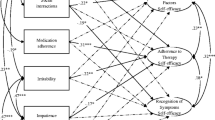Abstract
The aim of the present study was to examine whether a new low-cost psychological self-help intervention program with minimal coaching could be effective in improving depressed mood in people with peripheral arterial disease (PAD). Thirteen persons with PAD and depressive symptoms participated in the self-help program, grounded in cognitive-behavioral therapy. They completed pre-test, post-test and follow-up questionnaires, including the PHQ-9, to measure symptoms of depression. To evaluate changes in depression scores from pre- to post-test to follow-up measurement, non-parametric repeated measures Wilcoxon signed rank tests were performed. The results showed that participants’ depression scores significantly improved from pre-test to post-test and that there was no relapse from post-test to follow-up. The cognitive-behavioral self-help intervention could be an effective tool in people with PAD, to reduce symptoms of depression.
Similar content being viewed by others
References
Arseven, A., Guralnik, J. M., O’Brien, E., Liu, K., & McGrae McDermott, M. (2001). Peripheral arterial disease and depressed mood in older men and women. Vascular Medicine, 6, 229–234.
Aslam, F., Haque, A., Foody, J., & Lee, V. (2009). Peripheral arterial disease: Current perspectives and new trends in management. Southern Medical Journal, 102, 1141–1149.
Breek, J. C., Hamming, J. F., de Vries, J., van Berge Henegouwen, D. P., & van Heck, G. L. (2002). The impact of walking impairment, cardiovascular risk factors, and comorbidity of quality of life in patient with intermittent claudication. Journal of Vascular Surgery, 36, 94–99.
Garnefski, N., Grol, M., Kraaij, V., & Hamming, J. (2009a). Cognitive coping and goal adjustment in people with peripheral arterial disease: Relationships with depressive symptoms. Patient Education and Counseling, 76, 132–137.
Garnefski, N., & Kraaij, V. (2011). Effects of a cognitive behavioral self-help program on depressed mood for people with acquired chronic physical impairments: A pilot randomized controlled trial. Patient Education and Counseling, 85, 304–307.
Garnefski, N., & Kraaij, V. (2012). Effects of a cognitive behavioral self-help program on emotional problems for people with acquired hearing loss: A randomized controlled trial. Journal of Deaf Studies and Deaf Education, 17, 75–84.
Garnefski, N., Kraaij, V., de Graaf, M., & Karels, L. (2010). Psychological intervention targets for people with visual impairments: The importance of cognitive coping and goal adjustment. Disability and Rehabilitation, 32, 142–147.
Garnefski, N., Kraaij, V., Schroevers, M. J., Aarnink, J., van der Heiden, D. J., van Es, S. M., et al. (2009b). Cognitive coping and goal adjustment after first-time myocardial infarction: Relationships with symptoms of depression. Behavioral Medicine, 35, 79–86.
Garnefski, N., Kraaij, V., Schroevers, M. J., & Somsen, G. A. (2008). Posttraumatic growth after a myocardial infarction: A matter of personality, psychological health, or cognitive coping? Journal of Clinical Psychology in Medical Settings, 15, 270–277.
Gellatly, J., Bower, P., Hennessy, S., Richards, D., Gilbody, S., & Lovell, K. (2007). What makes self-help interventions effective in the management of depressive symptoms? Meta-analysis and meta-regression. Psychological Medicine, 37, 1217–1228.
Kraaij, V., van Emmerik, A., Garnefski, N., Schroevers, M. J., Lo-Fo-Wong, D., van Empelen, P., et al. (2010). Effects of a cognitive behavioral self-help program and a computerized structured writing intervention on depressed mood for HIV-infected people: A pilot randomized controlled trial. Patient Education and Counseling, 80, 200–204.
Kraaij, V., van der Veek, S. M., Garnefski, N., Schroevers, M. J., Witlox, R., & Maes, S. (2008). Coping, goal adjustment, and psychological well-being in HIV-infected men who have sex with men. AIDS Patient Care STDS, 22, 395–402.
Kroenke, K., Spitzer, R. L., & Williams, J. B. (2001). The PHQ-9: Validity of a brief depression severity measure. Journal of General Internal Medicine, 16, 606–613.
Lichtman, J. H., Bigger, J. T., Blumenthal, J. A., Frasure-Smith, N., Kaufmann, P. G., Lesperance, F., et al. (2008). Depression and coronary heart disease: Recommendations for screening, referral and treatment. Circulation, 118, 1768–1775.
McGrae McDermott, M., Greenland, P., Guralnik, J. M., Liu, K., Criqui, M. H., Pearce, W. H., et al. (2003). Depressive symptoms and lower extremity functioning in men and women with peripheral arterial disease. Journal of General Internal Medicine, 18, 461–467.
Morgan, A. J., & Jorm, A. F. (2008). Self-help interventions for depressive disorders and depressive symptoms: A systematic review. Annals of General Psychiatry, 7, 1–23.
Papworth, M. (2006). Issues and outcomes associated with adult mental health self-help materials: A ‘second order’ review or ‘qualitative meta-review’. Journal of Mental Health, 15, 387–409.
Pratt, A. G., Norris, E. R., & Kaufmann, M. (2005). Peripheral vascular disease and depression. Journal of Vascular Nursing, 23, 123–127.
Schroevers, M., Kraaij, V., & Garnefski, N. (2008). How do cancer patients manage unattainable personal goals and regulate their emotions? An examination of the relations between goal adjustment, cognitive emotion-regulation strategies, and positive and negative affect. British Journal of Health Psychology, 13, 551–562.
Smolderen, K. G. E., Aquarius, A. E., de Vries, J., Smith, O. R. F., Hamming, J. F., & Denollet, J. (2008). Depressive symptoms in peripheral arterial disease: A follow-up study on prevalence, stability and risk factors. Journal of Affective Disorders, 110, 27–35.
Sobel, D. S. (1995). Rethinking medicine: Improving health outcomes with cost-effective psychosocial interventions. Psychosomatic Medicine, 57, 234–244.
Thombs, B. D., de Jonge, P., Coyne, J. C., Whooley, M. A., Frasure-Smith, N., Mitchell, A. J., et al. (2008). Depression screening and patient outcomes in cardiovascular care. JAMA, 300, 2161–2171.
Wann-Hansson, C., Hallberg, I. R., Klevsgard, R., & Anderson, E. (2005). Patients experiences of living with peripheral arterial disease awaiting intervention: A qualitative study. International Journal of Nursing Studies, 42, 851–862.
Whooley, M. A. (2009). To screen or not to screen? Depression in patients with cardiovascular disease. Journal of the American College of Cardiology, 54, 891–893.
Author information
Authors and Affiliations
Corresponding author
Rights and permissions
About this article
Cite this article
Garnefski, N., Kraaij, V., Wijers, E. et al. Effects of a Cognitive-Behavioral Self-Help Program on Depressed Mood for People with Peripheral Arterial Disease. J Clin Psychol Med Settings 20, 186–191 (2013). https://doi.org/10.1007/s10880-012-9336-x
Published:
Issue Date:
DOI: https://doi.org/10.1007/s10880-012-9336-x




